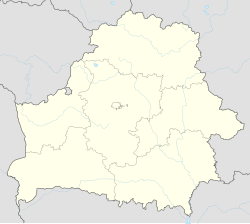You can help expand this article with text translated from the corresponding article in Belarusian. (February 2024) Click for important translation instructions.
|
| Mstsislaw
Мсціслаў (Belarusian) Мстиславль (Russian)Mstislavl | |
|---|---|
| Town | |
 The trading arcade, 19th century The trading arcade, 19th century | |
 Flag Flag Coat of arms Coat of arms | |
 | |
| Coordinates: 54°1′N 31°43′E / 54.017°N 31.717°E / 54.017; 31.717 | |
| Country | Belarus |
| Region | Mogilev Region |
| District | Mstsislaw District |
| First mentioned | 1156 |
| Population | |
| • Total | 10,019 |
| Time zone | UTC+3 (MSK) |
| License plate | 6 |
Mstislaw or Mstislavl (Belarusian: Мсціслаў, romanized: Mscislaŭ, IPA: [msʲt͡sʲiˈsɫau̯] ; Russian: Мстиславль, IPA: [msʲtʲɪˈslavlʲ]; Polish: Mścisław, Lithuanian: Mstislavlis) is a town in Mogilev Region, Belarus. It serves as the administrative center of Mstsislaw District. In 2009, its population was 10,804. As of 2024, it has a population of 10,019.
History
Mstislavl was first mentioned in the Ipatiev Chronicle in 1156. It was initially a part of the Principality of Smolensk, but had become the capital of the Principality of Mstislavl by 1180. In the Middle Ages, it was the seat of the Mstislavsky princely family. Pyotr Mstislavets is believed to have been born in Mstislavl.
In 1377, the town joined the Grand Duchy of Lithuania with the free will of its residents. The first Lithuanian duke of Mstislavl was Karigaila, brother of Jogaila. The town remained part of the Polish–Lithuanian Commonwealth under the Mścisław Voivodship until the Partitions of Poland in 1772.
Buildings of historic interest in the town include the Carmelite church (1637, renovated 1746–50) and the Jesuit cathedral (1640, renovated 1730–38, turned into an Orthodox cathedral in 1842).
Jews had a historic presence in the town. In 1939, there were 2,067 Jews living in Mstislavl, representing almost 20% of the local population. The German army occupied the town in July 1941. In early October, they killed 30 elderly Jews. On October 15, 1941, together with the local police, they murdered between 850 and 1,300 Jews.
The town is the birthplace of Jewish historian and writer Simon Dubnow, Jewish statesman and Communist politician Yakov Chubin, and expressionist artist Abraham A. Manievich, among others.
Gallery
-
Jesuit Collegium building, from the 17th century
-
Mstislaw Male Gymnasium, from the beginning of the 19th century
-
 Alexander Nevsky Orthodox Cathedral, built in the 19th century on the foundation of an earlier Catholic Cathedral
Alexander Nevsky Orthodox Cathedral, built in the 19th century on the foundation of an earlier Catholic Cathedral
-
 Orthodox Church
Orthodox Church
-
 Ruins of the Church of Saint Michael the Archangel
Ruins of the Church of Saint Michael the Archangel
-
 Church of the Assumption of the Blessed Virgin Mary
Church of the Assumption of the Blessed Virgin Mary
References
- ^ "Численность населения на 1 января 2024 г. и среднегодовая численность населения за 2023 год по Республике Беларусь в разрезе областей, районов, городов, поселков городского типа". belsat.gov.by. Archived from the original on 2 April 2024. Retrieved 13 April 2024.
- "Official website of the district" (in Russian). Mstsislaw District. Retrieved 20 February 2015.
- "Website of Mogilyov Region administration" (in Russian). Mogilyov Oblast Administration. 2015. Retrieved 20 February 2015.
- Численность населения областей и районов: Могилевская (PDF) (in Russian). Национальный статистический комитет Республики Беларусь. Archived from the original (PDF) on 18 September 2010. Retrieved 30 January 2012.
- "YAHAD - IN UNUM". www.yahadmap.org. Retrieved 21 October 2018.
External links
- Photos on Radzima.org
- The murder of the Jews of Mstsislaw during World War II, at Yad Vashem website.
- More information about Mscislaw in Belarusian
| Subdivisions of Mogilev Region, Belarus | |
|---|---|
| Districts (raiony) | |
| Cities and towns | |